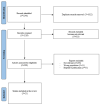The Psychiatric Consequences of Long-COVID: A Scoping Review
- PMID: 36579511
- PMCID: PMC9697474
- DOI: 10.3390/jpm12111767
The Psychiatric Consequences of Long-COVID: A Scoping Review
Abstract
The COVID-19 pandemic has represented a new form of traumatic event, affecting the general population worldwide and causing severe disruption of daily routine. A new urgent concern is related to the burden associated with COVID-19 symptoms that persist beyond the onset of infection, the so-called long-COVID syndrome. The present paper aims to: (1) describe the most frequent psychiatric symptoms reported by patients affected by long-COVID syndrome; (2) evaluate methodological discrepancies among the available studies; (3) inform clinicians and policy-makers on the possible strategies to be promoted in order to manage the psychiatric consequences of long-COVID syndrome. Twenty-one papers have been included in the present review, mostly with a cross-sectional or cohort design. Significant heterogeneity of long-COVID syndrome definitions was found. The presence of psychiatric symptoms was evaluated with very different assessment tools. The most common psychiatric symptoms of the long-COVID syndrome included fatigue, cognitive disturbances/impairment, depression, and anxiety symptoms. The rate of fatigue varied from 93.2-82.3% to 11.5%, cognitive impairment/cognitive dysfunction from 61.4% to 23.5% and depressive-anxiety symptoms from 23.5%to 9.5%.
Keywords: anxiety; cognitive impairment; depression; fatigue; long-COVID syndrome.
Conflict of interest statement
The authors declare no conflict of interest.
Figures
References
Publication types
LinkOut - more resources
Full Text Sources


